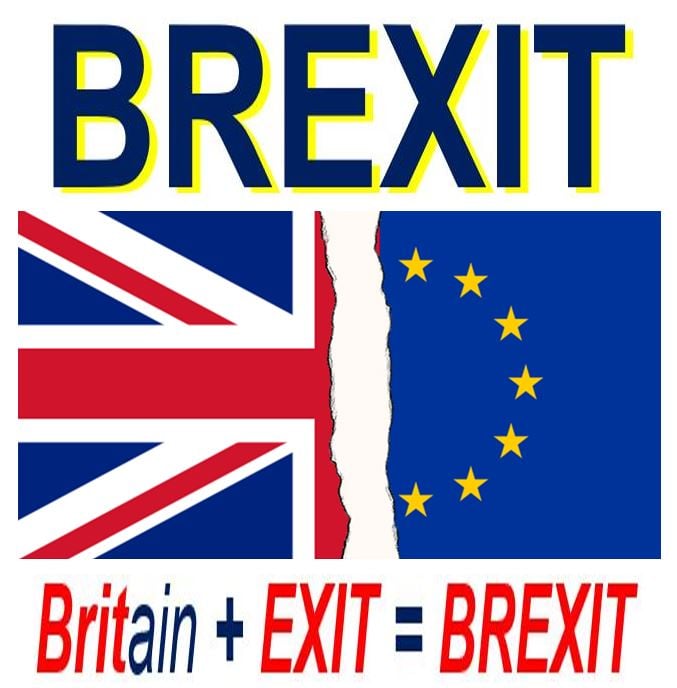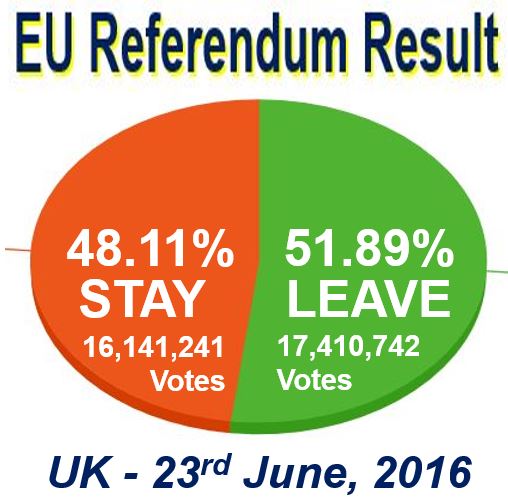Brexit – definition and meaning
Brexit means ‘Britain exiting’ the European Union. Britons created Brexit by combining the beginning of the word Britain and adding the word Exit. The word started becoming popular during the 2015 General Election campaign. In his campaign, Conservative Party leader David Cameron promised an EU referendum.
In other words, Britons could choose whether to leave or stay in the EU. EU stands for the European Union.
Subsequently the Conservatives won the elections, and Mr. Cameron kept his word. There was a referendum on 23rd June 2016. To many people’s surprise the Brexiteers won. Brexiteers are people in favour of leaving the EU.
In fact, it was a very close vote. The Brexiteers got 51.9% of the vote, compared to 48.1% who voted to remain.
BREXIT = BRitain + EXIT. In other words, it means ‘Britain exiting from the European Union.’

Grexit and then Brexit Meaning
Etymologists say that we formed the word Brexit as an analogy of Grexit. Etymologists are people who study the origin of words.
Before the EU referendum, Greece had experienced a serious financial crisis and desperately needed funds to stay afloat. During that time, there was a lot of talk about a Grexit, i.e. Greece exiting the EU.
In other words, Brexit was a term that followed Grexit, one referring to Britain and the other to Greece. Both cases refer to a country withdrawing from the European Union.
BREXIN or BRIN?
The opposite of BREXIT is BREXIN. However, linguists argue that the word does not make sense. The letters BR make sense; they come from BRitain. However, where does EXIN come from?
Shouldn’t the opposite of Brexit be BRIN (BRitain + IN)?
It is probably a bit too late now anyway, given that the people have decided. Unless, of course, we eventually have another referendum! Then the term will come back into fashion.
BREGRET – A new term
In June 2016, another emerged – the verb to BREGRET. It is a combination of BRitain, Exit, and reGRET.

Many people who voted to leave the EU on Thursday, woke up on Friday morning in shock. They watched stunned to see the pound nosedive, stock markets declining, and Prime Minister David Cameron resigning.
Furthermore, the Financial Times reported that many banks were making plans to move operations out of London and into an EU city.
There was disbelief when the leave campaigners began breaking their promises. For example, they had promised that the UK’s EU contributions would go to the NHS. The immediately broke that promise.
The world’s top credit rating agencies then demoted Britain’s sovereign rating to ‘negative.’
Many people regretted how they had voted. In other words, they said they would have voted to remain had they known the consequences.
We still don’t know whether a person who BEGRETS is a BREGETTER or BREGETTEER. This is because the word has not been around for long enough to determine which one is the official term. In fact, we do not even know whether the official term will eventually have a double or single ‘t’.
Soft versus Hard Brexit Consequences
Hard Brexit refers to the UK separating from the EU completely. In other words, regaining total control over immigration but losing free access to the EU market.
Soft Brexit refers to a type of semi-detached separation in which Britain still has free access to the EU market. However, a Soft Brexit means Britain cannot control how many EU citizens live and work in the UK.
Most businesses want the Soft option. In fact, businesses warn that losing access to the EU market would devastate the UK economy.
Most pro-leave voters say that regaining control of the country’s borders is a top priority. Therefore, a Soft Brexit would be extremely unpopular.
Video – The meaning of Brexit
In this Washington and Lee University video, Andrew Blick, director of History & Policy at King’s College London, talks about ‘The Meaning of Brexit’.

